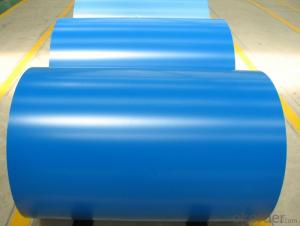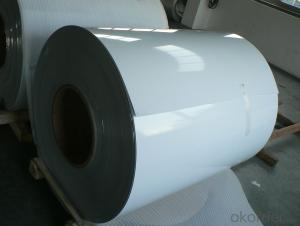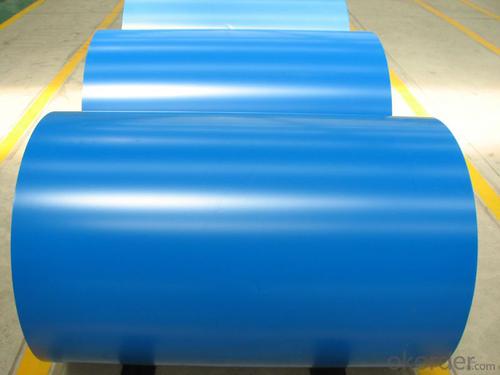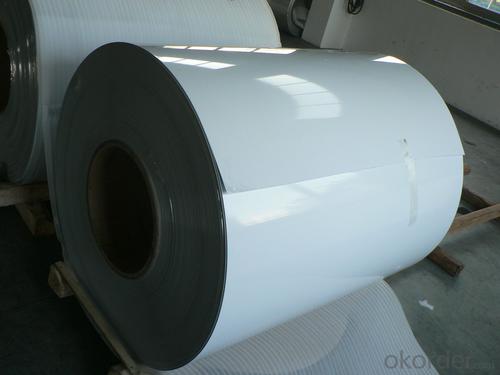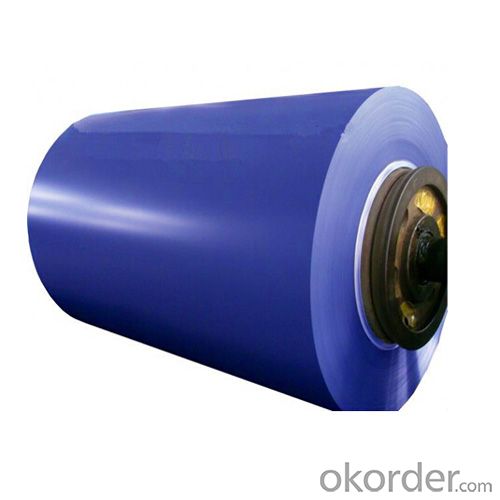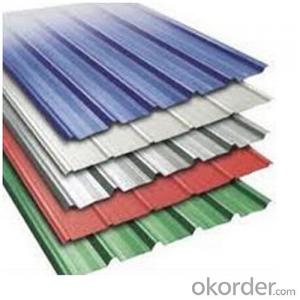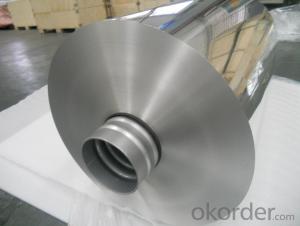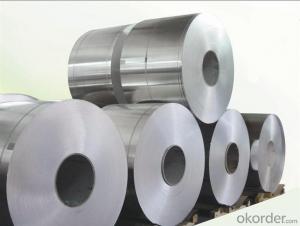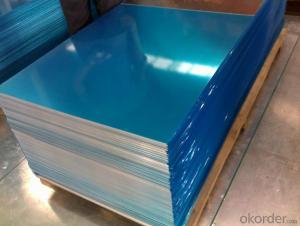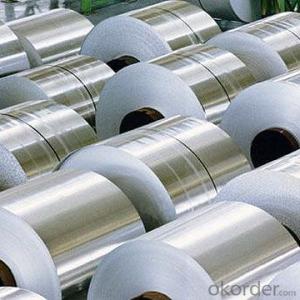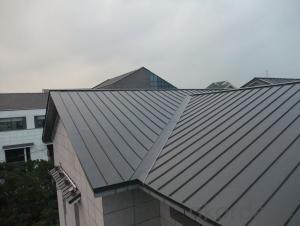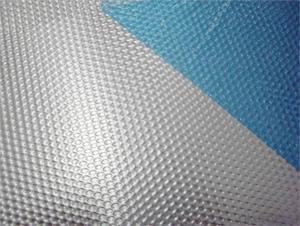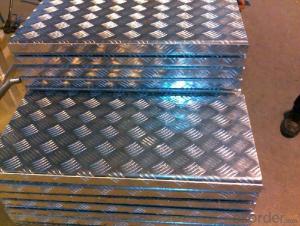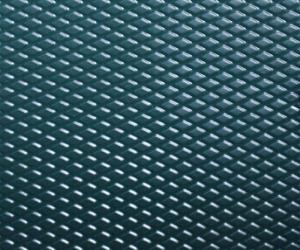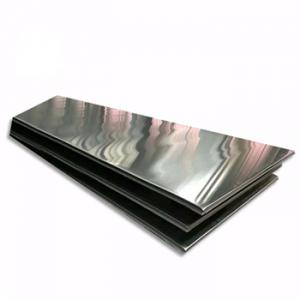6061 Aluminum Embossed Sheet for Roofing Application - 5-Pack
- Loading Port:
- Shanghai
- Payment Terms:
- TT OR LC
- Min Order Qty:
- 8 m.t.
- Supply Capability:
- 1000 m.t./month
OKorder Service Pledge
OKorder Financial Service
You Might Also Like
Specification
Structure of Aluminium Embossed Sheet for Roofing Application Description:
Coated aluminum coil/sheet are of a wide range of colors, which gives wonderful appearance no matter in residential and commercial constructions of great exhibition centers.
The coated aluminum coil/sheet have been widely used in the fields of construction and decoration( garage doors, ceiling etc.), electronic appliances, lighting decoration, air-condition air pipes, sandwich panels and drainages etc.
Main Features of the Aluminium Embossed Sheet for Roofing Application:
1) High flexibility
2) Impact resistance
3) Excellent weather-proof durability
4) Anti-ultraviolet
5) High erosion resist
Images of the Aluminium Embossed Sheet for Roofing Application:
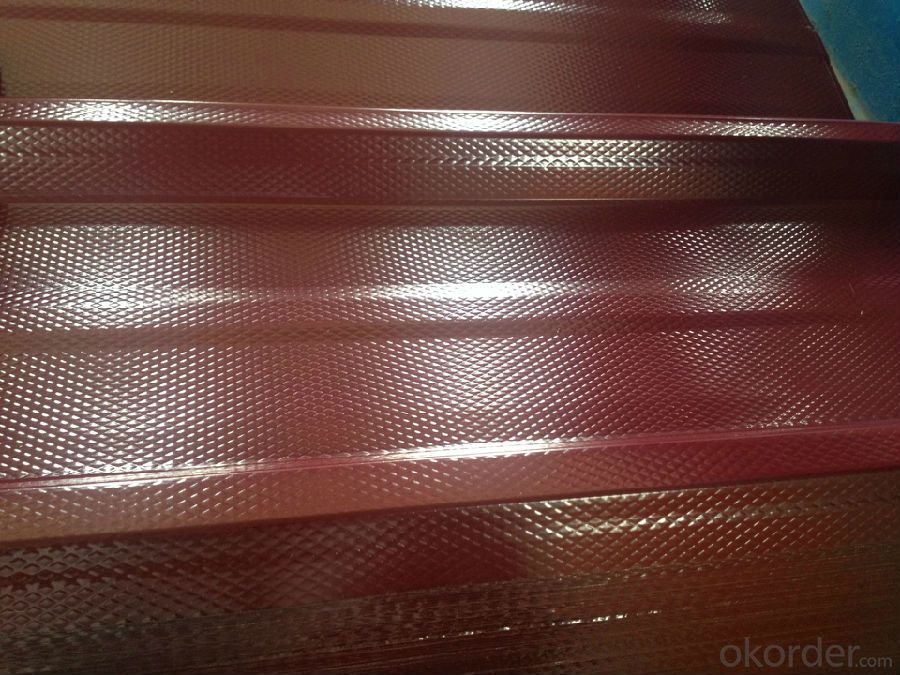
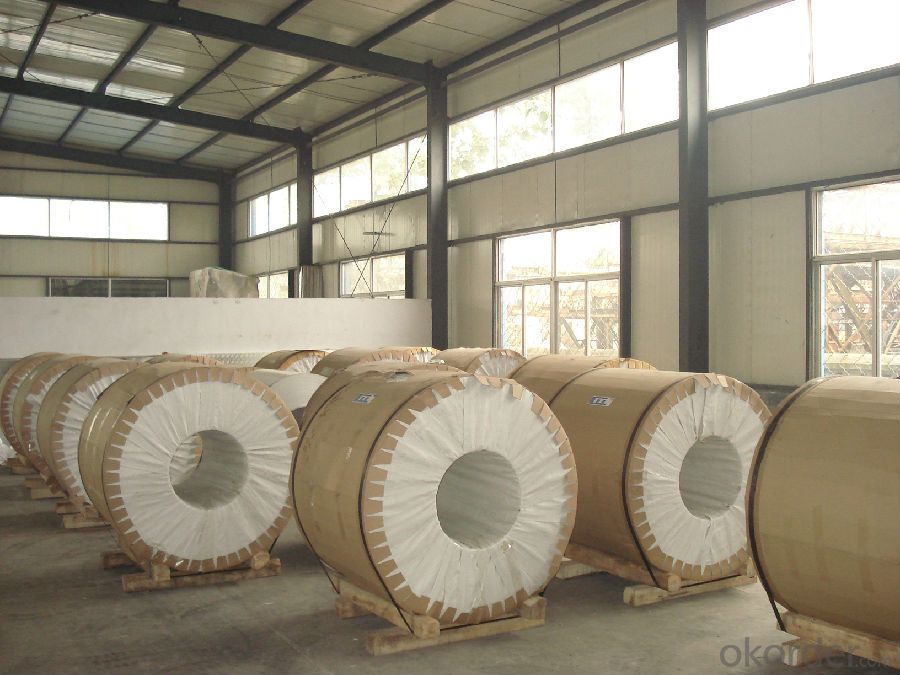
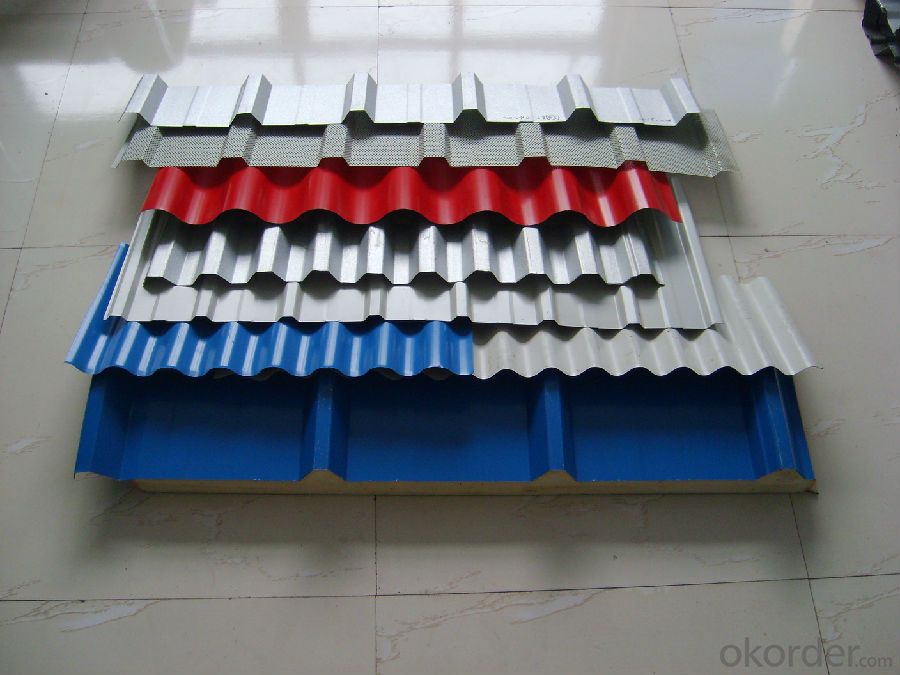
Aluminium Embossed Sheet for Roofing Application Specification:
Alloy | A1100,A3003,A1050,A8011 etc |
Temper | H16,H18,H24 |
Thickness | From 0.024mm to 1.2mm |
Width | Standard width:1240mm |
Special width:1300mm,1520mm,1570mm,1595mm | |
Diameter | Standard dia:1200mm |
Interior dia:150mm,405mm,505mm | |
Weight | 2.5 T/coil,3.0 T/coil |
Coating | PE, PVDF, AC |
Surface | Embossed, mill finish, coated |
Color | AS to code RAL |
Gloss | 10-90%(EN ISO-2813:1994) |
Coating Thickness | PE: more than 18 micron |
PVDF: more than 25 micron | |
Coating Hardness (pencil resistance) | More than 2h |
Coating adhesion | 5J(EN ISO-2409:1994) |
Impact Resistance | No peeling or cracking(50 kg/cm,ASTMD-2794:1993) |
Flexibility (T-bend) | 2T |
MEK resistance | More than 100 |
FAQ Aluminium Prepaited Coil:
a.What is monthly capacity
---CNBM is one stated own company and our monthly capacity is about 2000tons.
b. Now which countries do you export your goods?
---Now we export to South East Asia,Africa, North America,South America ect.
- Q: If not, where can i buy some aluminum?
- Elemental aluminum is far too reactive to exist in nature therefore it must be found in a compound with something else. Aluminum foil is actually made up of aluminum alloys. An alloy is a solid metal created by combining at least one metal with at least one other chemical. One classic example of an alloy is steel. Steel is mostly iron bonded to carbon atoms throughout it's structure. While aluminum foil is technically 92-99% aluminum, it is not pure (elemental) aluminum. Other chemicals that may be found in the alloys are typically other metals: copper, magnesium, manganese, silicon, and zinc. Other nonmetal chemicals may be found aswell like: oxygen (oxides), sulfates (SO4), Phosphates (PO4), and chlorides. You cannot buy elemental aluminum however since aluminum foil is generally 92-99% aluminum it is still a great source if you need aluminum as a reagent. Just for added trivia, the most common form of aluminum on earth is as the mineral Bauxite which is a hydrate of aluminum (Various forms of aluminum bonded to a hydroxide (OH) group such as Al(OH)3, and Al(OH)).
- Q: What are the rules and standards that govern the use of aluminum sheets in construction projects?
- <p>Yes, there are regulations regarding the use of aluminum sheets in construction. These regulations vary by country and region but generally cover aspects such as material standards, safety, and environmental impact. For instance, in the United States, the American Society for Testing and Materials (ASTM) provides standards for aluminum sheet materials. Building codes like the International Building Code (IBC) also specify requirements for the use of aluminum in construction. These regulations ensure that aluminum sheets meet certain strength, durability, and performance criteria. Compliance with these regulations is crucial for safety, structural integrity, and to obtain necessary permits and approvals for construction projects.</p>
- Q: This question seeks to understand the specific characteristics of aluminum sheets that make them suitable for various applications.
- <p>Aluminum sheets possess several properties that make them versatile for different applications: 1. Corrosion resistance: Aluminum forms a protective oxide layer, which makes it resistant to corrosion. 2. Lightweight: Aluminum is lighter than many other metals, which is beneficial for applications where weight is a concern. 3. High strength-to-weight ratio: Despite being lightweight, aluminum is strong and durable. 4. Good thermal and electrical conductivity: Aluminum conducts heat and electricity well, making it ideal for heat sinks and electrical components. 5. Formability: Aluminum can be easily shaped and bent, which is useful in construction and manufacturing. 6. Recyclability: Aluminum is highly recyclable, reducing waste and environmental impact. 7. Reflectivity: Aluminum reflects light and heat, which is useful in applications like solar reflectors and insulation. These properties vary in importance depending on the specific application, such as construction, automotive, aerospace, or consumer goods.</p>
- Q: Is it possible to utilize aluminum sheets in the interior design of vehicles?
- <p>Yes, aluminum sheets can be used for car interiors. They are lightweight, durable, and resistant to corrosion, making them suitable for various interior applications such as door panels, dashboards, and trim. Aluminum's malleability allows for easy shaping into complex designs, and it can be finished in various ways to match the aesthetic of the vehicle's interior. Additionally, its strength-to-weight ratio contributes to fuel efficiency and performance. However, it's important to consider the specific alloy and treatment of the aluminum to ensure it meets safety and comfort standards.</p>
- Q: Are aluminum sheets suitable for harsh weather conditions?
- Aluminum sheets are highly suitable for harsh weather conditions due to their exceptional properties. Aluminum is a lightweight yet durable material that offers excellent resistance against corrosion, rust, and UV radiation. This makes it particularly resilient against the damaging effects of extreme weather conditions such as heavy rain, snow, high winds, and intense sunlight. Furthermore, aluminum has a high strength-to-weight ratio, allowing it to withstand the pressure exerted by severe weather without sustaining significant damage. Additionally, aluminum sheets can be coated with protective finishes such as anodization or powder coating, further enhancing their ability to withstand harsh climates. Overall, aluminum sheets are an excellent choice for applications requiring resilience in harsh weather conditions.
- Q: Explain the various types of coatings that can be applied to aluminum sheets.
- <p>Aluminum sheets can be coated with several options to enhance their appearance, durability, and functionality. These include: 1) Anodizing, which creates a protective oxide layer, 2) Powder coating, offering a wide range of colors and textures, 3) Liquid painting, for a smooth, painted finish, 4) Laminating, which bonds a protective film to the surface, 5) Electrolytic coloring, resulting in a variety of colors, 6) PVD (Physical Vapor Deposition), for a high-quality, durable finish, and 7) Thermal spraying, applying a coating to improve wear resistance. Each method serves different purposes and has its advantages and limitations.</p>
- Q: Are 101 aluminum sheets suitable for conductive heat transfer applications?
- No, 101 aluminum sheets are not suitable for conductive heat transfer applications. 101 aluminum is a commercially pure aluminum alloy that has low electrical conductivity. It is not able to efficiently conduct heat, making it unsuitable for applications where heat transfer is desired. For conductive heat transfer applications, it is better to use alloys that have higher thermal conductivity, such as 6061 or 7075 aluminum. These alloys have better heat transfer properties and are commonly used in heat sinks, heat exchangers, and other applications where efficient heat transfer is required.
- Q: Can aluminum sheet be welded?
- Indeed, welding aluminum sheet is feasible. Aluminum, a versatile metal, lends itself well to welding through the utilization of diverse techniques like gas tungsten arc welding (GTAW), gas metal arc welding (GMAW), and resistance spot welding (RSW). Nevertheless, the welding of aluminum necessitates specific considerations due to its elevated thermal conductivity and low melting point when compared to other metals. Consequently, selecting the suitable welding process, filler material, and shielding gas is crucial to ensuring a successful weld. Moreover, proper surface preparation, including thorough cleaning and the removal of any oxide layer, plays a pivotal role in achieving a robust and long-lasting weld in aluminum sheet.
- Q: Are aluminum sheets suitable for food storage containers?
- Yes, aluminum sheets are suitable for food storage containers. Aluminum is a safe and durable material that is resistant to corrosion, making it ideal for storing and preserving food. It also has excellent heat conduction properties, allowing for even cooking and reheating.
- Q: What are the different types of protective films available for aluminum sheets?
- There exists a variety of protective films for aluminum sheets, each offering distinct features and advantages. Some commonly used types include: 1. Polyethylene (PE) film: PE film is a favored option for safeguarding aluminum sheets due to its versatility and cost-effectiveness. It serves as a temporary shield against scratches, dust, dirt, and moisture during storage, transportation, and fabrication processes. PE film can be effortlessly applied and removed without leaving residue or causing damage to the aluminum sheet's surface. 2. Polyvinyl Chloride (PVC) film: PVC film is another popular protective film for aluminum sheets. It provides excellent protection against scratches, abrasions, and UV rays. Known for its durability, PVC film is suitable for long-term applications. It is available in different thicknesses and can be customized to meet specific requirements. 3. Polyolefin film: Polyolefin film is a type of shrink film that ensures comprehensive protection for aluminum sheets. It exhibits high resistance against punctures, tears, and moisture. By heat-shrinking onto the aluminum surface, polyolefin film creates a secure seal, preventing any damage during handling, storage, or transit. 4. Polyester film: Polyester film is a high-performance protective film that offers exceptional resistance against chemicals, solvents, and extreme temperatures. It serves as an excellent barrier against moisture, preventing corrosion and oxidation of the aluminum sheet. Polyester film is commonly utilized in demanding applications where maximum protection is required. 5. Adhesive-backed film: Adhesive-backed films are self-adhesive protective films that can be easily applied and firmly bonded to aluminum sheets. They provide a temporary protective layer against scratches, stains, and other surface damages. Available with different adhesive strengths, adhesive-backed films can be removed effortlessly without leaving residue or causing harm to the aluminum surface. It is crucial to choose the appropriate type of protective film based on the specific requirements and conditions in which the aluminum sheets will be utilized.
Send your message to us
6061 Aluminum Embossed Sheet for Roofing Application - 5-Pack
- Loading Port:
- Shanghai
- Payment Terms:
- TT OR LC
- Min Order Qty:
- 8 m.t.
- Supply Capability:
- 1000 m.t./month
OKorder Service Pledge
OKorder Financial Service
Similar products
Hot products
Hot Searches
Related keywords
